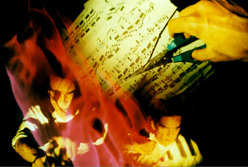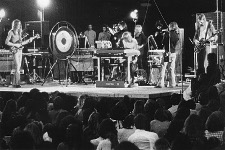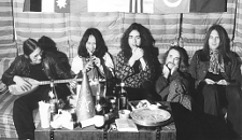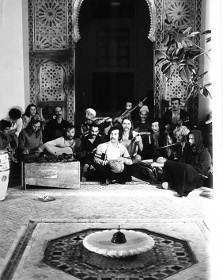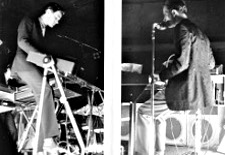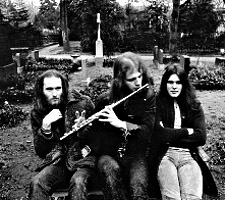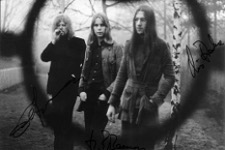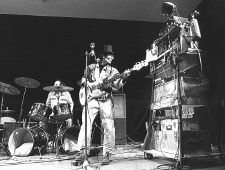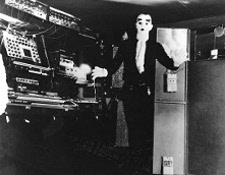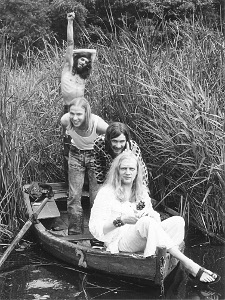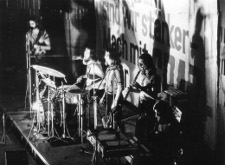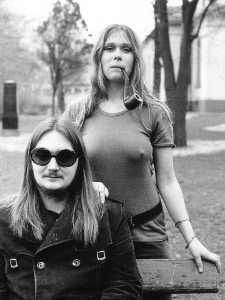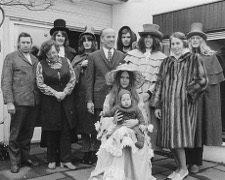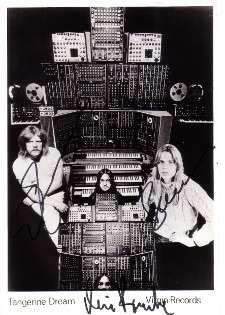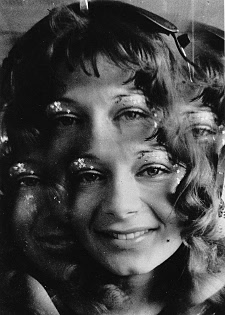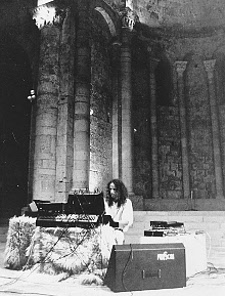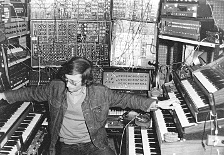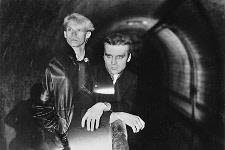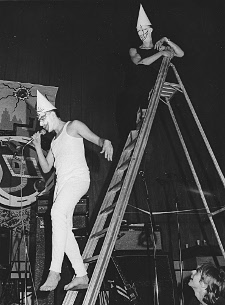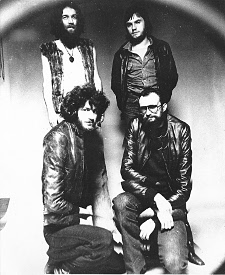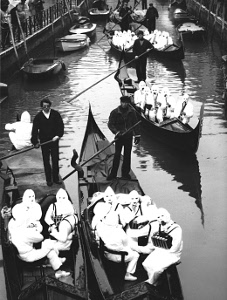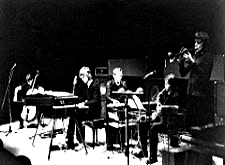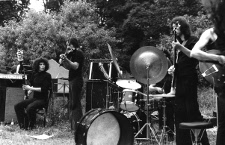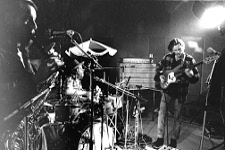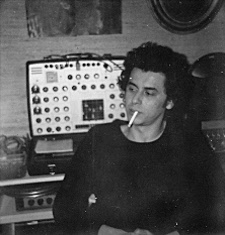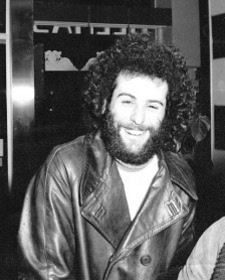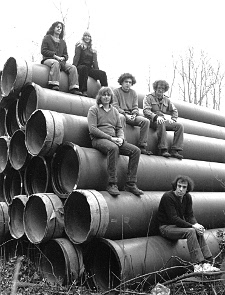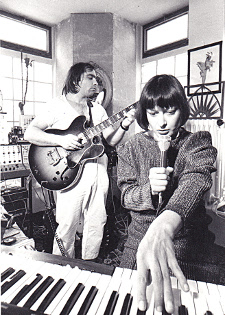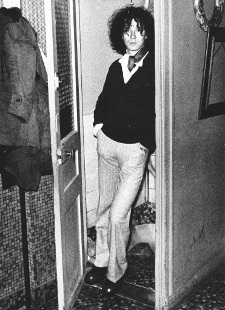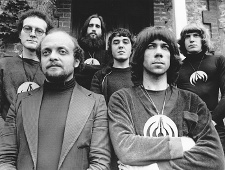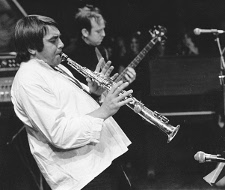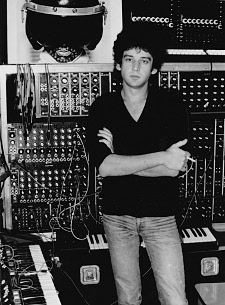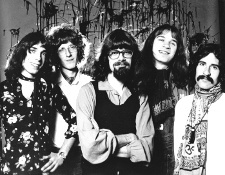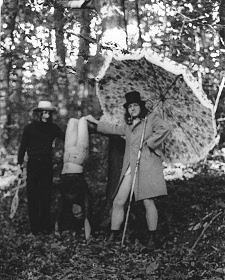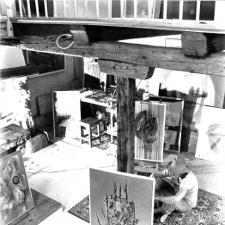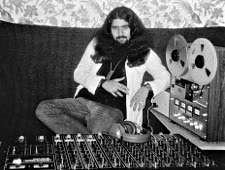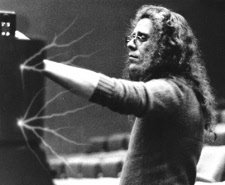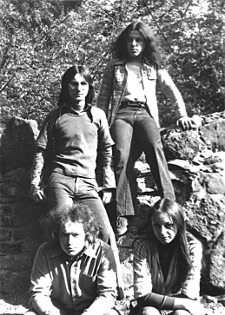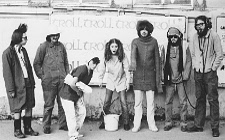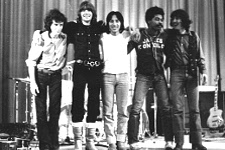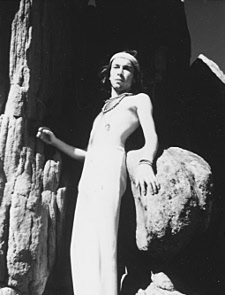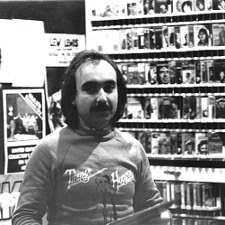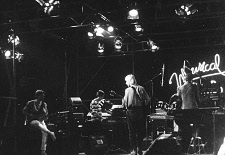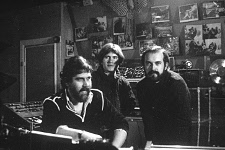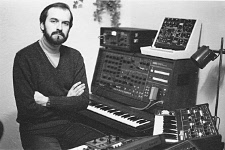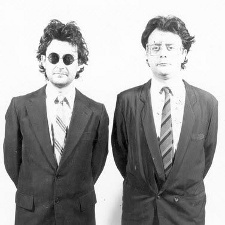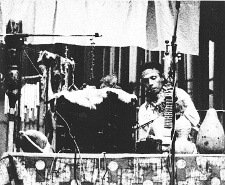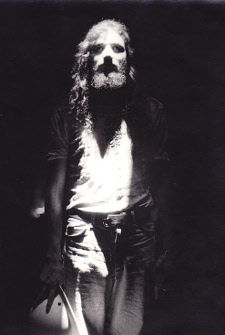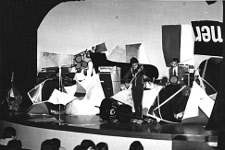The Story so far...
1970's- FM radio, Alternative Magazine & 1st US Indie Distributor of Euro Rock
1980's- D.I.Y. LP + Cassette & CD label
1990's- Distribution via the WWW
2010- Eurock.com ~ Multimedia Podcasting, Interviews & Reviews.
Label & Artist Submissions Accepted for Review...
Klassik Krautrock
Artistes Français
|

The Mythos of Rolf-Ulrich Kaiser
Rolf-Ulrich Kaiser was in many ways was the man who served as catalyst for the "krautrock" revolution. A music journalist and promoter he founded OHR Music Productions and the OHR Record label that released the first albums by German "experimental" rock and folk artists. He and his long time life partner, fashion designer Gerlinde "Gille" Lettmann, later became known as The Cosmic Couriers and created a sensation on the German rock scene until at some point the two simply vanished from the scene.
For almost 40 years, there have been countless stories and wild rumors that Rolf had dosed himself out of reality and ended up in a psychiatric hospital somewhere in Germany. That he had lost his mind due to excessive use of LSD, begged on the streets, ultimately died and was buried in a paupers grave. In addition, that Gille had stayed in that same hospital for a time and since gone completely around the bend due to drugs as well. Like much of what's been written and passed around as what happened during and after that era, those wild fabrications turned out to be untrue. Their story is however a sad one, as is much of what really happened and has come to pass in the wake of the swinging 1960s.

(Photo Eurock Archives)
Some time ago, I got an email from a German television producer who said he was working on a program about the history of Deutsch Rock. He wanted to know if I could help him contact Rolf-Ulrich Kaiser. In fact, the past few years on WDR TV there were two programs that dealt with the history of Krautrock. That moniker was first used circa 1970/71 in a couple articles written that first exposing the new German rock music scene to the UK pop audience. Most German musicians did not like that as they considered it a derogatory slang term.
Not coincidentally, it was reading those very articles that served as impetus for the creation of EUROCK, which began firstly as a radio show in 1971, then morphed into a magazine in 1973. Both initially featured the newly emerging experimental European rock scene, Germany being the primary focus early on.
One of the TV programs entitled KRAUT & RUBEN was a 6-week series of one-hour documentaries on German rock of the Golden Era. It contained abundant historical video and current interviews with some of the pioneers. The video was fascinating, the interviews in German. Whether they shed any light on the Cosmic Ones, I do not know. My guess is not however as Kaiser was nowhere to be found among the footage. In the revisionist historical tradition of modern artists, almost universally those who gave them their first opportunity to pursue the stairway to music stardom are persona non grata. For the most part that certainly was the case with Kaiser in Germany.
The other program entitled, DIE DEUTSCHROCK NACHT 1 + 2 produced by Rockpalast, aired on two consecutive Sundays, 6 hours of music each night. It again featured video of German rock legends then and now. A kaleidoscope of sights and sounds, the early footage was at times amazing, others laughable. The more modern footage and interviews on both shows served as a vivid reminder that for the most part the gods of German rock have gotten old and become legends in their own minds. Again, there was no trace or mention of Kaiser.
For the record, Rolf-Ulrich Kaisers beginnings were as a Dutch pop journalist who made a name for himself by interviewing and writing books in the late 60s, early 70s that were published in Germany. One of the first was on Frank Zappa during the Mothers of Inventions heyday, OVER HET BEGIN EN HET EINDE VAN DE PROGRESSIEVE POP MUZIEK. Among others, was a social look at (The New Pop Music) DIE NIEW POP MUZIEK, as well as UNDERGROUND? POP? NO! COUNTER-CULTURE! Kaiser also was co-organizer of the ESSEN INTERNATIONAL SONG DAY 1968, the first gathering of the youth-culture music tribes in Germany.
In 1969 he founded OHR Music Production Ltd. Germanys first independent rock label OHR (Ear) with the help of Berlin music publisher Peter Meisel. OHR dared to release German music that operated outside of that countries conservative Schlager tradition. The bands recorded were not simply Anglo-cover bands, some sang in German, others were experimental sonic explorers, agit-rock politicos, and folk-culture freaks.
The music OHR released was considered by those in the business to have no commercial potential. The label was the first to specialize in indigenous rock music productions in Germany, in effect creating a kind of underground scene. Kaiser also served as manager of some of the bands, which at the time was illegal in Germany. That got him called before government officials and fined 30,000 DM.

http://www.youtube.com/watch?v=sa0rpCgVLs4
He also was involved in an infamous 1971 TV discussion about the German capitalist music business. There ensued an argument and the manager of Berlin radical agit-rock band Ton Steine Scherben, Nikel Pallat, wielded an axe and chopped a table, while Kaiser and several others dodged debris. Chaos ensued and the program abruptly went off the air. You might say that the confluence of all of Kaisers energies had kicked off the start of a homegrown rock revolution in Germany.
In the beginning, Rolf and Gille were reportedly somewhat naive until they took LSD. That experience caused some sort of consciousness shift that ultimately led them down the cosmic path. It also created an apparent paradox between their business ideals, and their business practices that were more conservative. The result later was a clash between them and their artists who were into the hippie do-your-own-thing trip, struggling to break free from their conservative roots and Nazi influenced socio-economic order of their parents generation. The artists also did not like their music promoted as cosmic. In retrospect, you can see that the seeds were being sown for most all of what happened later on, in the case of the Cosmic Couriers in Germany, as well as the so called youth cultural revolution around the world. Foresight is incredibly rare, in hindsight things often are more clearly understandable.
My fascination was the radical new music they produced, some of which was in fact incredibly adventurous, amazingly unique, and certainly fuelled by artists who were familiar with illicit substances. The direct involvement of EUROCK with Rolf and Gille centered around the 1975 KOSMISCHE MUSIK special issue which would feature in depth coverage of their label and artists. I had a friend who was spending the summer in Germany doing studies at the Goethe Institute. So I arranged for him to visit the couple at their home in Cologne. He did an interview, spent the afternoon with them and told me when he returned they were quite nice, rather reserved, and appeared not at all to be the spaced out cosmic type conveyed by their public image. In fact, he said they very straight and businesslike and their reality did not seem to match at all the mythos their promotion suggested.
Due to the exposure that EUROCK issue gave Cosmic Music, I was able to arrange for distribution of their releases in the USA via JEM Imports. At the time, JEM was the largest US import distributor, which also had its own record label (Passport) as well. Whatever anyone might say about his style in his heyday Kaiser did achieve no small measure of success in making a name for the best of his artists in Europe, the UK and the USA. Substantial interest was generated among commercial labels inside and outside of Germany for some of its main artists.
While the OHR releases were light years from being hits or selling big numbers, they were indeed a cultural phenomenon of sorts coming out of Germany with its stark conservative history. Kaiser continued the OHR Music Production Company, also ran the PILZ Record label and ultimately created the KOSMISCHE MUSIK label. All of these in turn paved the way for other major label companies to establish their own label imprints for native German rock music, e.g., Brain, Bacillus Records, a/o.
In Germany, the boom was on. All sorts of new bands, good and bad, signed deals with major labels, and many new DIY indie labels popped up as well. All of that happened in no small part due to Kaiser taking a risk to go where no one else would, offering his bands an opportunity during their free spirited youth to exercise their creativity, and promoting it. His knack for promotion was innovative and effective, especially for those early days when rock was not yet a major commercial commodity anywhere around the world.
The Jefferson Airplane, in November 1965, was paid $25,000 becoming the first US psychedelic band to sign a major label contract in the USA with RCA Records. I cannot say whom or when was the first in the UK? However, put into that perspective, less than five years later Kaisers efforts in conservative Germany seem all the more impressive. Art and commerce are two very different animals. Artists often may make great art, but rarely know little about effective promotion or marketing still today. In reality, most of the time it takes money to make money. For artists, the bottom line is most always show me the money. That is not so much a value judgment as a simple fact.
The catalyst for Kaisers fall was the release of a series of albums by the Cosmic Couriers, a jam band who were given free rein to explore in the studio and as a result created some truly unique, spatial music. A couple of the albums were innovative extended soundscapes of very high quality. Others were at times, laced with overdubbed voices, effects, and a heavy dose of the spirit of those times in order to achieve a more promotional effect for the labels overall concept.

(Photo Eurock Archives)
The main points of contention with Kaiser centered on drugs and the claim by some artists that they were not paid, did not know about, or authorize their release. That story is discounted by one of the main artists involved Manuel Goettsching:
The drugs had actually little to do with the music (nor the label), but they were present at this time in general. I speak of marihuana/ hashish, which were very popular in those days. Everyone under 30 smoked this and that, the elders did so years ago, and still the rivers flow. Drugs have been and will be a part of life, not necessarily, because one is a musician, a painter, an architect, or a psylocybinien? They were around and took a great part of my time; there was another drug I fell in love with - MUSIC.
Of course, I knew about the releases, of course, I had contracts before, and I received royalties, even in advance. This was all very little money, but that should be no argument to spread rumors around like this. You can say many things about the producer Rolf-Ulrich Kaiser, but I have no reason to say him to have acted incorrectly so far.
Whatever was the truth, multiple lawsuits resulted and Kaisers cosmic vision increasingly grew faint. The judge ruled against him. Everyone knows that justice is very often foreign to the gilded chambers of the court and the client with the best lawyer most often wins. Regardless, the result was a big legalistic bummer, Kaiser was personally broken and his OHR label bankrupt. I leave you to draw your own conclusions.
The labels more famous artists were freed and moved on to lucrative careers. Klaus Schulze signed to Brain Records (a subsidiary of the giant Metronome), Tangerine Dream and Ashra signed to the UK Virgin Records label. All have had their classic older works reissued multiple times. The original albums are now collector�s items, notable for not only their music in some cases, but also their creativity in art design and packaging, in many cases done by Peter Geitner (also rumored to be in an asylum). Dieter Dierks now holds the rights to the OHR music catalog that was not claimed by the original artists. Various titles in the catalog have been exploited and haphazardly reissued over the years. Kaiser today is a ghost in the ether.
In many ways, Kaisers work foreshadowed the much less imaginative and mindlessly crass form of hyperbole that permeates all media today. Every sort of product by now has been proclaimed, 'Revolutionary', or pick your own pseudo-cultural adjective. Offhand I cannot think of one that has been labeled cosmic. Not only is that term laced with an implicit sense of humor, it also definitely has a unique connotation that is hard to tack onto selling some form of crap to a mass-market audience in a mall or supermarket. In real marketing terms, originating that genre was a small act of genius by Kaiser.
As it turns out Eurock's role in this cosmic melodrama was modest, coming a bit before their final fall from grace. It was also observed from afar as a spectator, not up close and personal. That adds a different perspective, one with less real knowledge, but perhaps a more objective viewpoint. The basic facts are that the releases on Kaisers labels for the most part sold modestly, but did serve as springboards for several of his best artists to embark on their way to having long and successful careers. Some with lesser talents or marketability continued elsewhere as well, others went into other areas of life. History and hindsight often absolves most people of their misdeeds, except mass murders, and forgiveness is granted. Sadly, that does not seem to be the case with Kaiser.
In some ways, this situation served as a preview of life as we have made it today. It is no longer them, but us, our generation, who are in the drivers seat of our own destiny. In this regard, it does seem that whatever idealism we might have had beating in our hearts when we were young is now but a faint pulse at best. In today's material culture, the prevailing attitude is that the party should and go on forever. Wither the deeply held humanistic social ethos, replaced by a narcissistic view of life that is propelled into excess through the consumer marketplace. Front and center is the cult of celebrity.
I cannot pin down what exact malaise the story of Rolf-Ulrich Kaiser represents on a human scale. Alternatively, exactly what it says about life now, and the nature of relationships between those who make contact with each other as we travel through it. It is a tragic fact however, that on any street, in any city, in the global community today lost and nameless people wander. Some basic instinct tells me that no one should come to their end a refugee in their own land. We all deserve a better fate than that!
Recently I received new information about Rolf and Gille from German writer Jan Reetze:
Gille Lettmann and Rolf-Ulrich Kaiser are alive. They did not stay at a funny farm and never did. In the seventies, they were evicted first in Berlin because they did not pay the rent, then in Cologne for the same reason. After that, they both stayed at the home of Gilles mother near Cologne for several years.
After Gilles mother passed away, they were on social security and moved to a small house in the Sauerland area. They are not crazy, but - let us say, they live in their own world and do not accept any contacts.
The last time Rolf got in touch with the world outside was in the late eighties, when ZYX Records re-released the old OHR records. He wanted his share of the royalties, so ZYX had to make clear to him that he had lost the rights in these recordings long ago. Since then he has remained silent.
In 2003, it started again: They did not pay their rent, and finally the landlady from their apartment contacted Walter Westrupp (of Witth�ser and Westrupp) for help. Apparently, in 2007 he then found a place for them in a sort of open facility run by the Catholic Church somewhere in the Sauerland area. That is where they are now and prefer not to be in contact with the modern world.

The myth that the 1960s and its revolution was liberating and uplifting is certainly dead. That Rolf-Ulrich Kaiser became a victim of those times seems clear. That certainly was an era when there was magic in the music and the new mode of music being made rocked the foundation of civilization as we knew it then. The collateral damage was that it led to a future filled with broken promises, drugs, economic corporatism and the ascendency of self-serving relationships, coupled with mass consumption. Kaiser is only one of the many to be counted among the missing in our generation. His story however I think serves as a cautionary tale about our future. We should all take pause and think twice about our actions before jumping and be careful of judging too harshly, lest we receive false judgment ourselves.
It is now recognized that the heritage of (experimental) music is richer for the music coming out of Germany at that time. It's also a fact that Rolf-Ulrich Kaiser was responsible for much of what happened during the early years of that scene. Some of Germany's artists without doubt influenced the course of modern rock music. Many contemporaries have picked-up on the influences, production techniques and synthetic impulses that originated during that time. That music today serves as a rich cultural artifact documenting the sounds and creative spirit of a groundbreaking musical period, the original German Cosmic golden era.
It is sometimes hard to remember, but there was a time when the future appeared to be brighter and people felt that life would be better for us all. I personally hope that Rolf and Gille did find some form of retreat and shelter from the world as it is today, and happiness.
-A. Patterson
Addendum
Jan Reetze has also written a very long and informative article about The Comic Couriers. You can read it here: http://janreetze.blogspot.com/search/label/Rolf-Ulrich Kaiser"
 reviews features podcasts email bio
reviews features podcasts email bio
